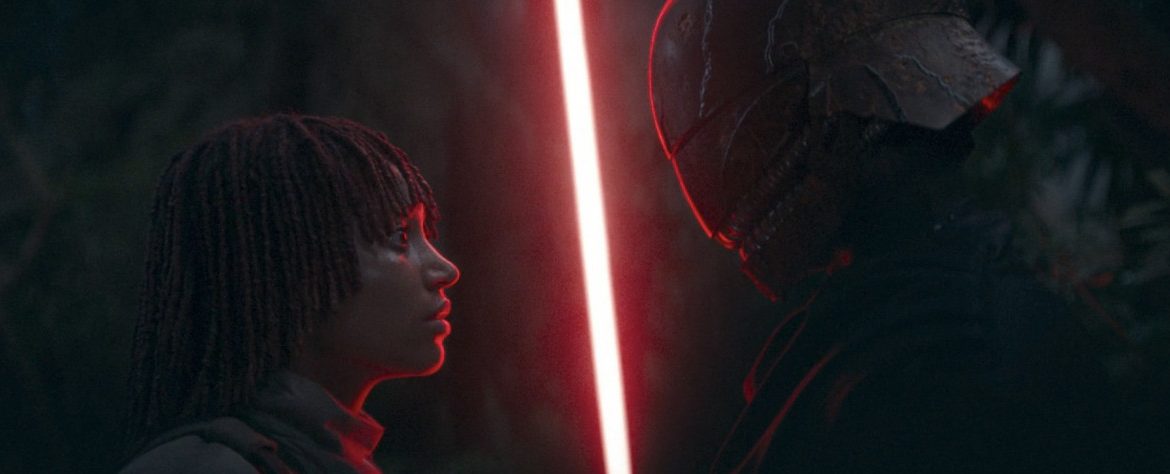Ever since George Lucas claimed the “echoes” between his original and prequel Star Wars trilogies were “poetry,” the mega-franchise has faced criticism of trapping characters in an everything-is-connected universe. When Kid Anakin is building C-3PO and Boba Fett’s dad is the base DNA for the Stormtroopers, Star Wars’ poetry suddenly looked more like Mad Libs than William Blake.
True to form, Lucasfilm’s newest series, The Acolyte, is forming similar echoes (hey, a show about twins!) and Easter eggs (turns out folks have a lot of strong feelings about Ki-Adi-Mundi). But its 100-year distance from known Skywalker Saga storytelling feels like expansion, the way history should. George R.R. Martin gets the approach — look at House of the Dragon — and The Acolyte creator Leslye Headland, mining the High Republic era, comes closer than most of her Star Wars contemporaries.
In episode 5, “Night,” Headland and The Acolyte’s writing team make a direct connection to a Big Star Wars thing, with the potential for an even loftier end goal: an embrace of sequel-trilogy lore. At least, I hope it is, because I am here for the Knights of Ren.
[Ed. note: This post contains major spoilers for The Acolyte episode 5.]
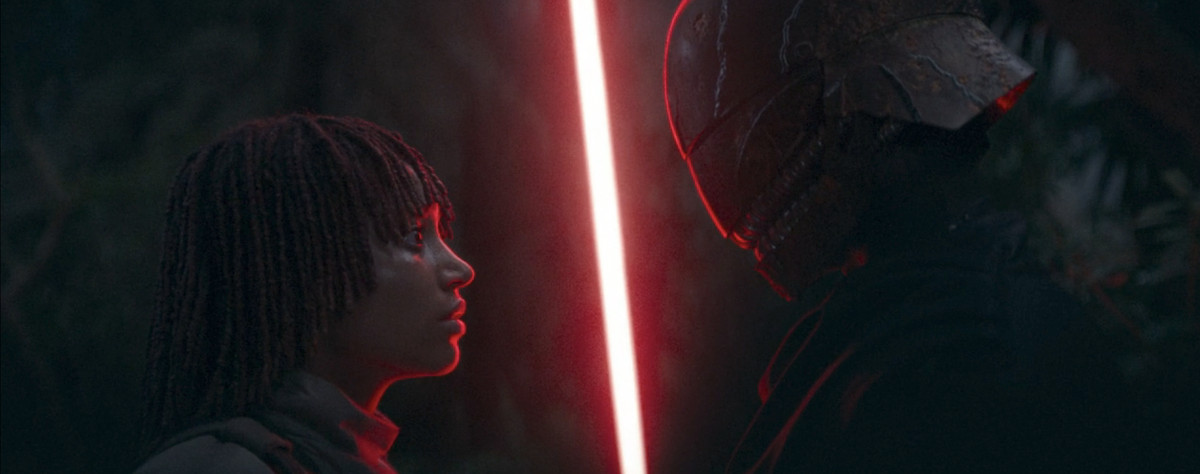
Picking up where episode 4, “Day,” left off, “Night” is wall-to-wall lightsaber action as the Master slices his way through Jedi adversaries, and Mae and Osha deal with their shit. A face off with Jecki Lon (Dafne Keen) finally takes the Master’s metal face… off… for the show’s big reveal: It’s been Qimir, a so-called smuggler who turns out to be a wannabe Sith Master who hoped Mae was his ticket to the big time.
When Sol asks him what he wants his answer is simple, if nebulous: “Freedom. The freedom to wield my power the way I like without having to answer to Jedi like you. I want a pupil, an acolyte. But this one went back on our deal.”
Star Wars fandom went into a meltdown after “Day,” when the aforementioned Ki-Adi-Mundi popped up at the Jedi morning meeting to discuss what to do about the Master and Mae. A faction of vocal fans jumped to the conclusion that the Master must be Sith, and that The Acolyte invalidated Ki-Adi-Mundi’s assertion in The Phantom Menace that “the Sith have been extinct for a millennium.” In theory, if Ki-Adi-Mundi and the High Republic Jedi (including Yoda) encountered a Sith back in the day, then Ki-Adi-Mundi is either a big fat liar in The Phantom Menace or The Acolyte broke canon. Or maybe the Master isn’t Sith?
“Night” does little to quell the fears of Ki-Adi-Mundi stans. When Sol has a chance to question the Master (emitting indie sleaze energy via actor Manny Jacinto), he comes up short. “I have no name,” the Master tells Sol, “but a Jedi like you might call me Sith.”
That’s an open-and-shut case for people who think the remaining three episodes of The Acolyte will offer zero dramatic turns or greater reveals. But the Master’s use of “might” is doing a lot of work for me, as well as his desperate attempt to find an acolyte. I’m surprised more of the upset Star Wars fans aren’t picking up what Jacinto is putting down in the scene: coming off like an extremely disgruntled fanboy.
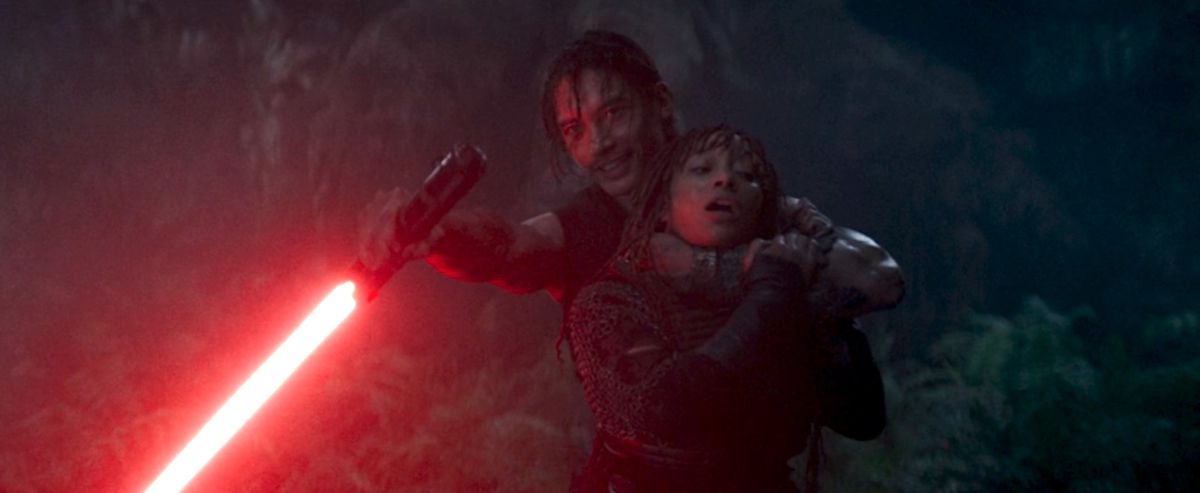
In the final scene of “Night,” the Master utters some poetic parting words for the smacked-down Osha. Behind him, composer Michael Abels creates another connection to Star Wars history by quoting John Williams’ Kylo Ren theme from The Force Awakens. This feels extremely telling — as a student of the genetically engineered Force-user Snoke (the sequels were a wild time!) who eventually led the Knights of Ren, Kylo was never a true Sith, just an enthusiast with Darth Vader memorabilia in his bedroom. Abels, nodding to Kylo through music, shades the Master with a similar gray; he might want Sol to refer to him as a Sith, but would a man of integrity like Ki-Adi-Mundi dignify
The blurriness has brought me to my most fan-theorizing moment of The Acolyte, and a bit of my own wishful thinking: The Master might be a founder of the Knights of Ren, previously seen in the sequel trilogy.
On top of the overt nod to Kylo, the design of the Master in The Acolyte is leaning way further into the Knights of Ren than anything in the Sith wardrobe. While the movies offered little in the way of explanation for the Knights of Ren, save for a passing mention by Snoke in The Force Awakens and their bits of action in The Rise of Skywalker, auxiliary Star Wars materials have carved out plenty of foundational canon in true Star Wars fashion. As depicted in the Rise of Kylo Ren comics (written by Charles Soule, who also happens to be an engineer of the High Republic era), the Knights were roided-out marauders who wielded the Force with abandon as they pillaged sites across the galaxy. Their vibe screams “would own a Cybertruck.”
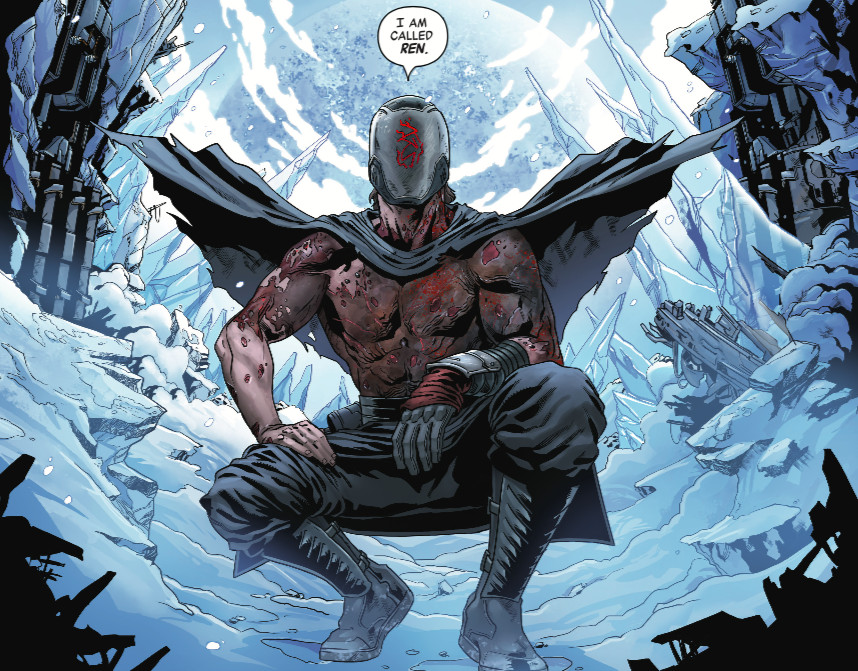
The Acolyte costume designer Jennifer Bryan told Polygon that Donnie Darko was a major inspiration for the creepy, toothed-smile look of the Master’s helmet, but when I saw him bust out his lightsaber moves in “Night,” muscled arms jabbing from under a flowing robe, I immediately pictured the leader of the Knights of Ren from the New Republic era. I could definitely see the Master running with [checks notes] “Vicrul, the Reaper of the Fallen” and other Knights of Ren with totally chill nicknames.
In 2022’s Star Wars: Crimson Reign, Charles Soule again expands the mythology of the Knights of Ren. The comic book series focuses on Qi’ra, from Solo (who has become unexpectedly vital to Star Wars lore?), and the attempt destabilize the growing Empire. Part of Qi’ra’s plan? Hiring the Knights of Ren to pull off a heist at Vader’s castle on Mustafar. The relevant but almost throwaway line in the action-forward book is that the Knights of Ren have existed for centuries — and at some point fell from grace.
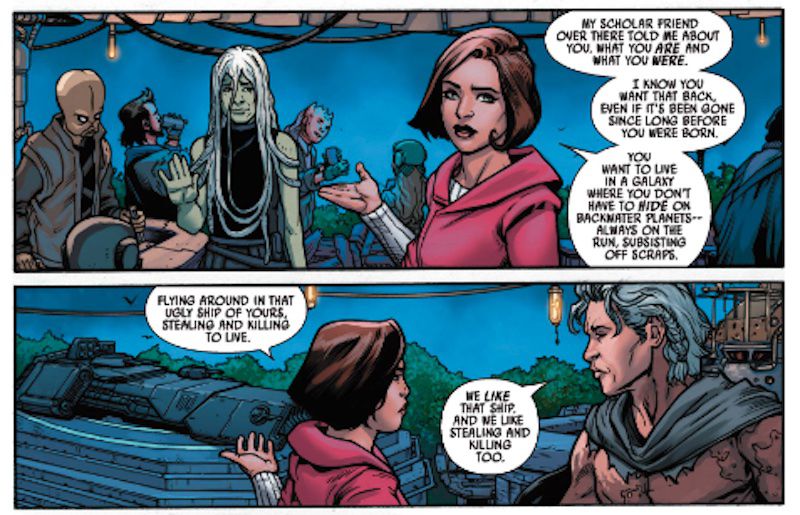
The Master may very well be the first step forward for a new age of Sith, and the Star Wars timeline continues to make less and less sense. But even as someone bristled over The Rise of Skywalker’s all-too-neat Palpatine connections and the Exquisite Corpse exercise of the sequel trilogy, I would be eager to see Headland thread the Knights of Ren into broader Star Wars context.
The intrigue of the original Star Wars movies was that everything we see, even in a flash, has history behind it. There’s danger in carving out the backstory of characters like the Knights of Ren, basically window dressing with legs, but as Soule proved out in the comics, they do play an essential role in Kylo’s (underbaked) journey to the Dark Side and the spectrum of Force use in the galaxy. The High Republic readers know there are already established marauders in this era — see: Marchion Ro and the vicious Nihil — but if Headland wants to make the Star Wars universe more cohesive, more lived-in, sidestepping the obvious reveal of a new Sith for something more complicated would be a delightful twist for The Acolyte. The “acolyte” of the title could be Mae or Osha, but as it stands after episode 5, the Master himself might fit the description, a devotee of the Dark Side who… just hasn’t invented the Knights of Ren yet.
